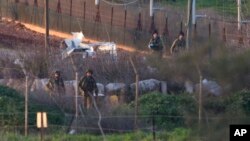Israeli officials say Syrian rebels are urging them to launch airstrikes against foreign Hezbollah militants and Iranian Shi'ite fighters backing President Bashar al-Assad's forces along the Jordanian and Israeli borders in southern Syria, according to the London-based Syrian Observatory for Human Rights.
Assad's commanders turned to the Lebanon-based radicals and Iranian fighters in a bid to thwart Syrian rebels from ramping up attacks near Damascus, said a representative from the UK-based pro-opposition monitoring group, which gets information from a network of informants on the ground inside Syria.
The group also says Syrian government forces have recently made “significant progress” both in the border regions near Jordan and in parts of the Golan Heights not already under Israeli control.
Activists say aerial support was an important factor in the Syrian forces' advance. The Syrian Observatory says Assad’s warplanes have carried out more than 650 airstrikes across the country this month alone, with most of those raids targeting southern Syria and suburbs of Damascus.
"Regime troops and their Hezbollah-led allies are advancing in the area linking Deraa, Quneitra and Damascus provinces," the Syrian Observatory said.
In a recent interview with Reuters, a senior rebel commander in the south, Abu Osama al-Jolani, predicted “the battle could be lengthy.” The rebels' tactics, he said, "will be hit and run — this is the system we are going to use in battle.”
Israeli raids
Israeli jets have attacked Hezbollah forces in Syria before, but not at the bidding of Syrian rebel commanders. They have focused their strikes on Lebanese Shia militiamen at times when Israeli commanders suspected they were transporting advanced weaponry — from Syrian arsenals or from their Iranian patrons — back into Lebanon for use in any future conflict with Israel.
An exception was a January 18 airstrike on a convoy in the Syrian Golan Heights that killed six Hezbollah fighters and an Iranian general. The general, Mohammad Allahdadi, was a senior figure in Tehran's military mission supporting the Syrian government. Israeli officials said they carried out that strike because they believed Hezbollah was planning an attack on Israel.
In Beirut, Hezbollah leader Hassan Nasrallah afterwards extolled the “fusion of Lebanese-Iranian blood on Syrian territory.” Hezbollah last fought Israel in 2006 in a 34-day war.
Former Israeli government official Mendi Safadi told The Jerusalem Post last week that “the Syrian opposition contacted me … and asked for me to relay a message to the [Israeli] prime minister that Israel should give Hezbollah and Iran another hard hit to stop their progress.”
He said Syrian government forces and their allies, Hezbollah and Iran, are “using all means” to seize control of territory in southern Syria that borders Israel.
Syria’s southern provinces are the last stronghold of moderate and Islamist insurgents battling the Assad government. They have lost much of their former territory in the north and east, either to militants from the so-called Islamic State group or to Jabhat al-Nusra, an al-Qaida affiliate. In western Syria, Hezbollah forces advanced rebel forces last year, and have since consolidated their gains.
Southern provinces fighting
The southern struggle has received the least international media coverage in the four-year-long civil war — in part because Western reporters have difficulty accessing the area.
“The rebels in the south comprise a diverse array of fighters,” according to analyst Aymenn Jawad al-Tamimi of the Middle East Forum, a U.S.-based think tank. A “relative lack of in-fighting and increased cooperation” between them has made it difficult for the Assad government to make decisive gains against them, he said. Notably, the Islamic State has little presence in the south, just as Jabhat al-Nusra has made little headway outside the Damascus suburbs.
Moderate and Islamist brigades have been supplied with arms shipments by Western and Gulf powers via Jordan, say rebel commanders. Those supplies have continued apace while some rebel brigades in the north have this year seen their shipments and aid reduced by the U.S., according to rebel commanders.
US officials, speaking on the condition of anonymity, acknowledge that they have cut all support to four of sixteen brigades they had been aiding in the north. Of the remaining 12, some brigades have also seen reductions in American financial support.
They say the funding cuts are a reflection of brigades collapsing in the face of jihadist attacks, or because of a failure to perform.
A moderate rebel commander in the north told VOA that the southern rebel brigades — some of which have received anti-tank missiles — are kept on a tighter leash by U.S. and Gulf backers than the northern brigades and are more directed in their fighting and operations.












